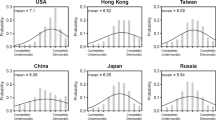Abstract
To date, most congressional scholars have relied upon a standard model of American electoral behavior developed in the presidential setting. This research extends our knowledge of Congressmen's incumbency advantages and their sources. Candidate preference is viewed as a function of the relative recognition and evaluation of incumbents and their challengers, as well as of Democrats and Republicans. In the recognition model, contact with voters and media effects are quite important, but there is no direct role for party identification. Evaluation is a function of personal contact and party identification, and media variables are insignificant. Relative recognition, relative evaluation, and party identification are three important predictors of candidate preference, and incumbency itself adds little beyond what is contained in incumbent recognition and evaluation advantages.
Similar content being viewed by others
References
Abramowitz, Alan I. (1975). “Name Familiarity, Reputation, and the Incumbency Effect in a Congressional Election.”Western Political Quarterly 27: 668–684.
--(1980). “Party and Individual Accountability in the 1978 Congressional Election.” Paper presented at the Rice-Houston Conference on Congressional Elections, January 10–12.
Campbell,et al. (1960).The American Voter, New York: Wiley.
Converse, Philip E. (1966). “Information Flow and the Stability of Partisan Attitudes.” In Angus Campbellet al. (eds.),Elections and the Political Order. New York: mWiley, 136–158.
Dreyer, Edward C. (1971–2). “Media Use and Electoral Choices: Some Political Consequences of Information Exposure.”Public Opinion Quarterly 35: 544–553.
Goldenberg, Edie N., and Michael W. Traugott (1980). “Campaign Effects on Outcome in the 1978 Congressional Elections.” Paper presented at the Rice-Houston Conference on Congressional Elections, January 10–12.
--(1979). “Resource Allocations and Broadcast Expenditures in Congressional Campaigns.” Paper presented at the 1979 Annual Meeting of the American Political Science Association Meeting, Washington, D.C., August 31–September 3.
Jacobson, Gary C. (1980). “Congressional Elections, 1978: The Case of the Vanishing Challengers.” Paper presented at the Rice-Houston Conference on Congressional Elections, January 10–12.
Mann, Thomas, and Raymond Wolfinger (1979). “Candidates and Parties in Congressional Elections.” Paper presented at the 1979 Annual Meeting of the American Political Science Association, Washington, D.C., August 31–September 3.
Mann, Thomas (1978).Unsafe at any Margin: Interpreting Congressional Elections. Washington: American Enterprise Institute.
Mayhew, David (1974). “Congressional Elections: The Case of the Vanishing Marginals.”Polity 6: 295–317.
Parker, Glenn (1980). “Incumbent Popularity and Electoral Success.” Paper presented at the Rice-Houston Conference on Congressional Elections, January 10–12.
Robinson, John P. (1974). “The Press as King-Maker: What Surveys from the Last Five Campaigns Show.”Journalism Quarterly Winter, pp. 587–594.
Author information
Authors and Affiliations
Additional information
An earlier version of this paper was presented at the 1980 annual meeting of the Western Political Science Association, San Francisco, March 1980.
Rights and permissions
About this article
Cite this article
Goldenberg, E.N., Traugott, M.W. Congressional campaign effects on candidate recognition and evaluation. Polit Behav 2, 61–90 (1980). https://doi.org/10.1007/BF00989756
Issue Date:
DOI: https://doi.org/10.1007/BF00989756




